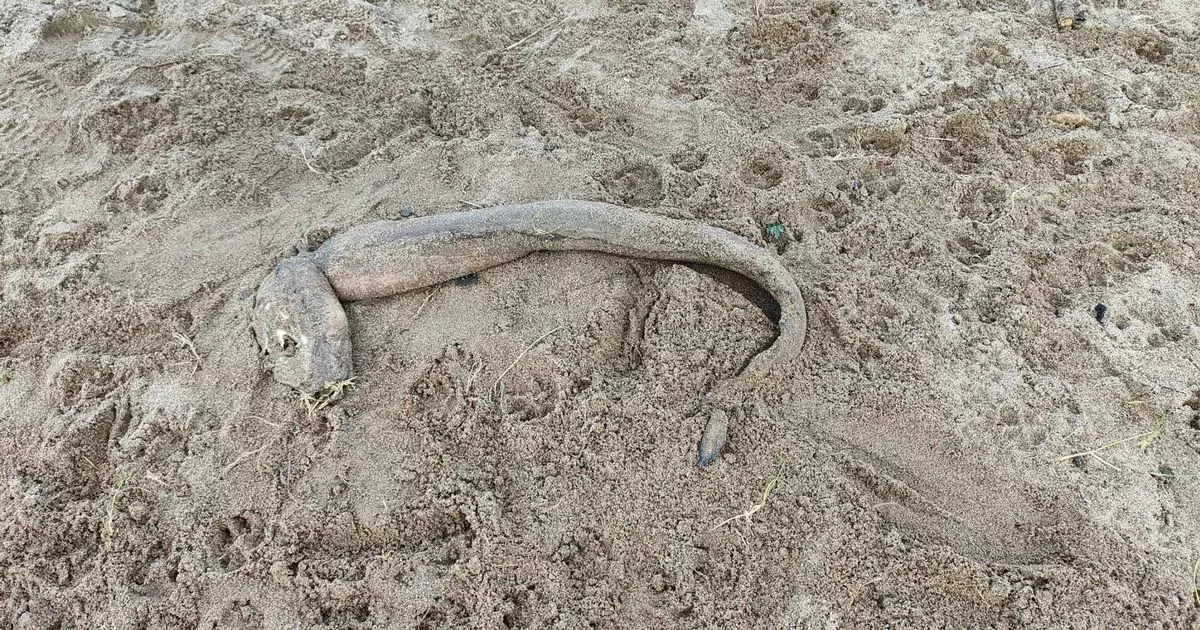UK beach horror as mum and baby stumble upon mysterious three-foot-long sea creature with 'no eyes' – The Mirror
Emily Scott, 23, was enjoying a stroll with her one-year-old baby Willow Harris when she came across the bizarre creature lying on the sand with what appeared to be no eyes in its head
A mum has shared photos of a monstrous sea creature she found washed up on a beach in Cornwall while out with her baby.
Emily Scott, 23, was enjoying a stroll with her one-year-old baby Willow Harris when she came across the bizarre creature lying on the sand with what appeared to be no eyes in its head.
She discovered the beast washed up on Par Beach, between St Austell and Fowey on the Cornish south coast, on January 6.
Emily said the sea animal was about three feet long, and she had been left “confused” after coming across it, saying it appeared to have no eyes.
“It was disguised in the sand at first I had no idea what it was at first,” Emily, a student, told NeedToKnow.online. “I wasn’t frightened, but was confused as its head was to the side.
“It looked as if it had no eyes. It was strange to see, especially right at the back of the beach, right up past the grass,” she added.
Emily reported the creature to Cornwall council, and the creature is believed to be a conger eel, the largest species of eel found in European waters, which can grow up to six feet in length. Conger eels are one of just two species of eels regularly caught by anglers in the UK and sightings of them washed up on beaches are rare.
They are described as predators of the sea – hunting down any fish species it can find for food, including dead and rotting fish. They also have a very unique look – with a long snake-like body and large eyes and lips. They also have extremely sharp teeth and scaleless skin.
Due to spawning in the Atlantic Ocean, conger eels are much more common along the western and southern coast of the British Isles. The eel could have ended up on the beach as a result of natural causes or an angler landing it.
Conger move to very deep water and die after spawning. They can also attack humans, although such attacks are rare but not unheard of. Despite their large eyes they are also virtually blind and hunt by smell at night.
Meanwhile a similar discovery was made near Exmouth Marina in Devon by Will Miles who came upon a blood-sucking “vampire fish” with a mouth full of razor sharp teeth was found washed up on the beach.
The 23-year-old was taking an after work stroll by the sea last week when he came across the bizarre creature. “It was very noticeable, lying in the centre part of the beach near the tideline – I was on a walk after work,“ he said.
The creature was in fact a sea lamprey – a species which sucks the blood of their prey, like a leech, giving them the name “vampire fish”. Once a common sight in UK waters, they have become rare, with their decline blamed on low water quality and man-made barriers in the rivers where they breed.
Sign up to FREE email alerts with news to brighten your day



 This year in odd news: The weirdest headlines from the Houston area in 2022 – KPRC Click2Houston
This year in odd news: The weirdest headlines from the Houston area in 2022 – KPRC Click2Houston 
